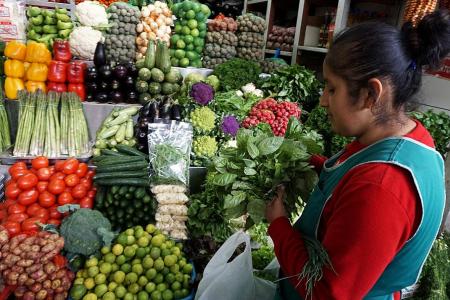Making the most of your fruits and vegetables
LEARN HOW TO STORE FRUITS AND VEGETABLES
Keep your foods fresh by putting them away properly when you get home.
Put the produce you picked up from the refrigerator section at the supermarket in your fridge.
Leave fruits and vegetables unwashed, as washing them can cause them to spoil. Toss any bad or mouldy parts to prevent the rot from spreading.
If you have herbs, extend their lifespan by wrapping them in a damp paper towel and putting them in an airtight container. If you picked up mushrooms, empty them into a paper bag so they will not turn damp and mushy.
FREEZE YOUR FOOD
Shopped too much and unable to use your herbs, fruits and vegetables fast enough?
Do not let them get yellow and wrinkly. Chop them up and store them in your freezer to preserve their nutrients and ensure a ready supply of produce whenever you need them.
Some foods freeze better than others. For soft, leafy herbs and berries that might turn mushy once defrosted, all is not lost. You can use the fruits in baked goods and add the greens to stews and sauces.
TRY BLANCHING
Not many home cooks do this, but to preserve the vibrancy of colour and taste in vegetables, as well as their vitamins and minerals, steam your greens for a minute or dip them in hot water before quickly taking them out and dunking them in icy water.
The heat will deactivate enzymes that cause deterioration while the cool water keeps produce crisp and crunchy.
At this point, you can either transfer the vegetables to the freezer or store them in the fridge so you can snack on them over the next few days.
LEAVE THEM WHOLE
On busy weeks, meal prepping can save time as well as money. But if possible, do not put your meals together too far in advance.
Chopping vegetables exposes more surfaces to air, which causes vitamins and minerals to oxidise and deteriorate.
Furthermore, nutrient levels go down the longer you leave your produce.
LIMIT THE COOKING
The longer you cook your food or the more times you reheat it, the less vitamins remain, so limit heat exposure as much as possible.
Besides, it is much more enjoyable to eat crisp and green vegetables instead of mushy leaves.
DRINK YOUR SOUP
Steaming tends to retain more vitamins and minerals in fruits and vegetables, as some nutrients such as folic acid and vitamins B and C are water-soluble.
So if you are making soup or stew, be sure to consume the whole lot so you do not miss out on the nutrients that leach into the water.
Get The New Paper on your phone with the free TNP app. Download from the Apple App Store or Google Play Store now



